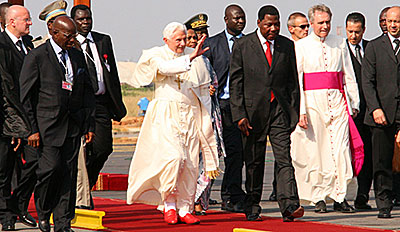
Thank You, Holy Father
As Pope Benedict XVI ends his pontificate, Catholic Relief Services offers our thanks for his years of Church leadership and, in particular, the gift of his encyclicals Deus Caritas Est ("God Is Love," 2005) and Caritas in Veritate ("Charity in Truth," 2009). The profound teaching in these two papal documents invigorates and encourages us each day as we serve our brothers and sisters living in poverty around the world.

In November 2011, Pope Benedict XVI waves to devotees as he lands at the Benin airport in western Africa. Photo by Helen Blakesley/CRS
Two important insights stand out in these papal documents:
-
Pope Benedict XVI made clear the importance of caritas, our love of neighbor, in the mission of the Church, in what he called "the dynamic of charity":
Charity is love received and given. It is "grace" (cháris). Its source is the wellspring of the Father's love for the Son, in the Holy Spirit. Love comes down to us from the Son. It is creative love, through which we have our being; it is redemptive love, through which we are recreated. Love is revealed and made present by Christ (cf. Jn 13:1) and "poured into our hearts through the Holy Spirit" (Rom 5:5). As the objects of God's love, men and women become subjects of charity, they are called to make themselves instruments of grace, so as to pour forth God's charity and to weave networks of charity.
This dynamic of charity received and given is what gives rise to the Church's social teaching, which is caritas in veritate in re sociali: the proclamation of the truth of Christ's love in society. (Caritas in Veritate, #5)
The Church cannot neglect the service of charity any more than she can neglect the Sacraments and the Word…. (Deus Caritas Est, #22)
The Church's deepest nature is expressed in her three-fold responsibility: of proclaiming the word of God (kerygma-martyria), celebrating the sacraments(leitourgia), and exercising the ministry of charity(diakonia). These duties presuppose each other and are inseparable. For the Church, charity is not a kind of welfare activity which could equally well be left to others, but is a part of her nature, an indispensable expression of her very being…. (#25)
Yet, while professional competence is a primary, fundamental requirement, it is not of itself sufficient. We are dealing with human beings, and human beings always need something more than technically proper care. They need humanity. They need heartfelt concern. Those who work for the Church's charitable organizations must be distinguished by the fact that they do not merely meet the needs of the moment, but they dedicate themselves to others with heartfelt concern, enabling them to experience the richness of their humanity. (#31)

-
Charity and justice are inextricably linked; justice is an essential part of charity:
If we love others with charity, then first of all we are just towards them. Not only is justice not extraneous to charity, not only is it not an alternative or parallel path to charity: justice is inseparable from charity, and intrinsic to it. Justice is the primary way of charity or, in Paul VI's words, "the minimum measure" of it, an integral part of the love "in deed and in truth" (1 Jn 3:18), to which Saint John exhorts us. (Caritas in Veritate, #6)
The Church cannot and must not take upon herself the political battle to bring about the most just society possible. She cannot and must not replace the State. Yet at the same time she cannot and must not remain on the sidelines in the fight for justice. She has to play her part through rational argument and she has to reawaken the spiritual energy without which justice, which always demands sacrifice, cannot prevail and prosper. A just society must be the achievement of politics, not of the Church. Yet the promotion of justice through efforts to bring about openness of mind and will to the demands of the common good is something which concerns the Church deeply. (Deus Caritas Est,#28).

